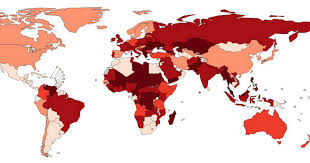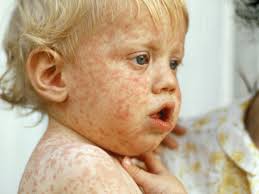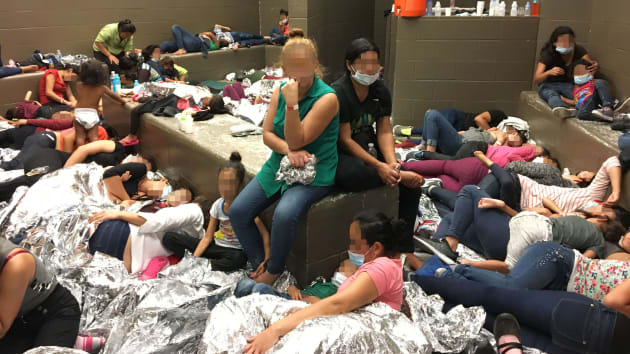Weren’t those diseases eradicated? No! Measles, now mumps are spreading. Is influenza next?
In November of 2018, an outbreak of measles in in the Orthodox Jewish community in the Williamsburg and Borough Park neighborhoods in Brooklyn, New York foretold the beginning of an epidemic. Throughout the remainder of the year health ministers of  countries including Ukraine, Romania, France, Greece, Italy, and yes, the U.S. continued to report outbreaks of measles. In 2017 the World Health Organization (WHO) had declared that the UK had eliminated measles. But by 2018 a marked increase in the number of confirmed measles cases meant that transmission of measles had been re-established.
countries including Ukraine, Romania, France, Greece, Italy, and yes, the U.S. continued to report outbreaks of measles. In 2017 the World Health Organization (WHO) had declared that the UK had eliminated measles. But by 2018 a marked increase in the number of confirmed measles cases meant that transmission of measles had been re-established.
Why? Despite there being an effective and safe vaccine since 1960, why are measles and other infectious diseases like mumps and rubella still around? As The Atlantic reports, researchers are blaming “misinfodemics” for spreading disease. They use the example of London’s “The Great Stink” of the summer of 1858 — outbreaks of cholera, plague, and chlamydia were blamed on the smell of the polluted River Thames.

Punch Magazine/Wikimedia Commons The silent highwayman: Death rows on the Thames, claiming the lives of victims who have not paid to have the river cleaned up, during the Great Stink. [Cartoon from Punch Magazine. July 10, 1858.]
But throughout the world, online health misinformation has increased the death toll from preventable diseases. The spread of conspiracy theories and scary pseudo-documentaries leads to vaccine reluctance or refusal to be vaccinated or to have one’s children vaccinated.
“Disease spreads via Facebook statuses and Google results—not just the droplets from a sneeze or the particles that linger in the air when we forget to cough properly into our elbow crease — and around the world, digital health misinformation is having increasingly catastrophic impacts on physical health. Misinformation based on discredited studies continues to mutate and spread online — in memes, articles, and videos, through platforms including Pinterest, Instagram, and Facebook. Like the germs running through the River Thames, toxic information now flows through our digital channels.”
And the spread of measles continues in 2019. CIDRAP (Center for Infectious Disease Research and Policy) reports, “Measles continues to spread in global outbreaks, with the first 6 months of 2019 producing more measles cases than any year since 2006.
Between Jan 1 and Jul 31, 2019, 182 countries reported 364,808 measles cases to the WHO. These cases represent a 10-fold increase in the WHO’s African region, a twofold increase in the European region, and a threefold increase in the Western Pacific Region.

World Health Organization. Measles cases have continued to climb into 2019. Preliminary global data shows that reported cases rose by 300 percent in the first three months of 2019, compared to the same period in 2018. This follows consecutive increases over the past two years.
“There have been almost three times as many cases reported to date in 2019 as there were at this same time last year,” the WHO said. “This follows successive yearly increases since 2016, indicating a concerning and continuing upsurge in the overall measles burden worldwide.”
Most countries are seeing outbreaks because they have very low vaccination rates, the WHO said. But even countries with high vaccine coverage are seeing more measles activity.
Measles is so contagious it requires a high community-level vaccination rate – 95% – to prevent sustained transmission. The measles, mumps, rubella (MMR) vaccine is effective and widely available as part of national vaccination programs.

But globally, WHO estimates only 86% children have received the first dose of measles vaccine and 69% the second in 2019.”
And as reported just this week, when Wisconsin children return to school this week, close to 50,000 will have waivers that exempt them from vaccines, leaving them vulnerable to measles at a time when the nation has experienced its largest outbreak in 27 years.
Measles (en español, el sarampión) is a potentially deadly and highly contagious viral disease. According to WHO, measles remains an important cause of death among young children globally, despite the availability of a safe and effective vaccine.
According to Popular Science, before the measles vaccine existed, nine out of every 10 kids got the disease before age 15. Two million people died from it every year. It’s easy for most of us to forget that because we’ve had an effective measles vaccine since 1960.
Measles is transmitted via droplets from the nose, mouth or throat of infected persons. According to the National Foundation for Infectious Diseases, you can get the measles just by being in the same room with an infected person — it’s that contagious — unless you’ve been vaccinated or you’ve acquired immunity by having had the measles.
Symptoms of measles include high fever, generalized rash, runny nose, pink, watery eyes, coughing, diarrhea, and earache. The average time between exposure to the measles virus and development of symptoms is usually 10 to 12 days but can range from as few as seven days to as many as 21. A rash develops, starting on the face and upper neck and gradually spreading downwards.
Popular Science reports that progress towards regional elimination targets is “off track.” Because symptoms don’t appear for a week or so after infection, patients have plenty of time to spread the highly contagious virus around before doctors know to quarantine them. To keep a population safe from measles, you need nearly everyone to be vaccinated. Even with most of Europe above the 90 percent mark for more than a decade now, there are still large outbreaks every year.”
Dr. Jaime Moreno is an internist practicing medicine in Cuenca, with offices at the Consultorios Santa Ines. He said that when he was a medical student in Cuenca the late 1970s he saw many cases of measles, with dire consequences.
Measles can have permanent disabling ramifications including pneumonia, brain inflammation, and middle-ear infection. Pregnant women who contract the measles incur a significant risk for miscarriage and low birth weight infants. As Dr. Moreno says, the success of the vaccination campaigns in Ecuador is obvious. In Cuenca, measles is an extremely rare disease.
Why are mumps outbreaks also on the rise?
Mumps is highly contagious and spread similarly to measles. As reported by the Cleveland Clinic, the measles-mumps-rubella (MMR) vaccine is 90 percent effective but it is 100 percent ineffective if it is not administered. According to the UK’s National Health Service, (NHS), mumps can lead to viral meningitis, encephalitis, deafness, orchitis (inflammation of the testicles) in men who have reached puberty, and ovaritis (inflammation of the ovaries) or mastitis (inflammation of the breasts) in women who have reached puberty.

Mumps has swept through 57 immigration detention facilities in 19 states since September. More than 80 percent were exposed while in custody.
As reported by CNBC (Friday, Aug 30, 2019), nearly 900 migrants contracted mumps in U.S. government detention facilities in the past year; outbreaks were spread across 57 facilities, and this is the first time a mumps outbreak was reported in detention facilities. The New York Times (August 29, 2019) reports that immigrants are crammed into detention centers with poor nutrition and sometimes absent hygiene: immune systems are compromised, making it a “perfect storm” for contracting communicable diseases. Alongside the outbreaks of measles and mumps, the coming flu season makes disease prevention impossible.
Safety and efficacy
The MMR vaccine gives protection against three serious diseases: measles, mumps, and rubella. Before the introduction of vaccines, all three diseases were extremely common and most people had them at some point, usually as children. Although many people survived without long-term effects, others were left with serious disabilities and some children died. The WHO recommends immunization for all susceptible children and adults for whom measles vaccination is not contraindicated.
Popular Science writes, “It’s so easy to forget what it was like when most children got the measles. Millions of people worldwide feel it’s not a priority to vaccinate their kids, probably in part because they can’t fathom a world where parents regularly lose children to the measles. But such a reality is not improbable, and we are only a couple generations removed from it.”
Roald Dahl, the famous children’s author, lost his own daughter, Olivia, to measles when she was seven and wrote a letter to every parent in 1986:
As the illness took its usual course I can remember reading to her often in bed and not feeling particularly alarmed about it. Then one morning, when she was well on the road to recovery, I was sitting on her bed showing her how to fashion little animals out of colored pipe-cleaners, and when it came to her turn to make one herself, I noticed that her fingers and her mind were not working together and she couldn’t do anything.
“Are you feeling all right?” I asked her.
“I feel all sleepy, ” she said.
In an hour, she was unconscious. In twelve hours she was dead.
It really is almost a crime to allow your child to go un-immunized.
The overwhelming majority (more than 95%) of measles deaths occur in populations with low per capita incomes and weak health infrastructures. Reaching all children with two doses of measles vaccine, either alone, or in a measles-rubella (MR), measles-mumps-rubella (MMR), or measles-mumps-rubella-varicella (MMRV) combination, should be the standard for all national immunization programs.
The Ecuador Ministry of Public Health has a program to vaccinate all children against these preventable diseases. Free vaccinations are generally available at any Ministerio de Salud Health Center throughout the country. Read more here on the Ministry of Public Health website: among the “beneficiary population groups” are children, pregnant women, and women of childbearing age, adults over 65, health personnel, and risk groups.
Influenza is another contagious disease that can cause complications and even death, but the vaccine is considered effective. The Ecuador Ministry of Health says the vaccination will be available in October. Read more from The Conversation about the 2019 flu vaccine. The 2019 vaccine is “showing early signs of being a good match for the common strains of the flu circulating this season.” As reported in El Tiempo, as of August 29, three cases of AH1N1 influenza confirmed in Guayaquil. Get your flu vaccine. Vaccination against influenza will begin in October and will focus on vulnerable groups such as children, pregnant women and the elderly.
Watch John Oliver debunk some conspiracy theories with credible science.
Read my earlier 2018 columns on health and vaccinations.
Vaccines: The myths, facts, and foolishness, continued …
What was life like before vaccines? Part III
Sources
CIDRAP: Center for Infectious Disease Research and Policy. Global measles outbreaks make 2019 a record-setting year.
Cleveland Clinic: Health Essentials. Why are mumps outbreaks on the rise?
CNBC. Nearly 900 migrants contracted mumps in holding centers in the past year.
El Tiempo. Confirmado en Guayaquil tres casos de influenza AH1N1.
GOV.UK. Public health matters. Measles in England.
Journal Sentenial. 50,000 unvaccinated children head to Wisconsin schools as the U.S. copes with worst measles outbreak in 27 years.
National Foundation for Infectious Diseases. Facts about Measles for Adults.
Popular Science. Thanks, anti-vaxxers: Measles is on the rise in Europe.
The Conversation. The 2019 flu shot isn’t perfect — but it’s still our best defense against influenza.
The New York Times. The Trump administration is creating a health nightmare near the border.
World Health Organization. Immunization, Vaccines and Biologicals.
World Health Organization. Measles.
____________________________
Susan Burke March, a Cuenca expat, is a Registered Dietitian Nutritionist and a Certified Diabetes Educator who specializes in smart solutions for weight loss and diabetes-related weight management. She is the representative from Ecuador for the International Academy of Nutrition & Dietetics. Write to her – SusanTheDietitian@gmail.com





















